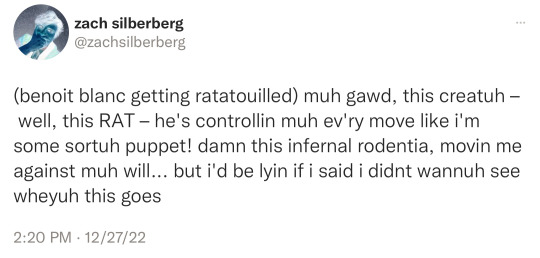Text
trey clover and responsibilities; a meta after his book 7 dream
[spoilers for jpn server book 7 content ahead!]
as the eldest brother trey has always been the 'responsible' one. but his wish is to live in peace, to never have expectations thrust onto him (hence his constant downplaying) but instead to use his passion and skill (baking), which is the one thing he doesn't downplay, to make the people around him happy. to see them smile while eating his food, to 'grow', for him to be able to see them enjoy themselves and for himself to do what he enjoys without restrictions. yet as cater reveals, not only did riddle freeze him out after his excitement (which as you can imagine, was painful for trey, as if the childhood scolding wasn't enough trauma. ESPECIALLY as he sees riddle as like a, to quote him, 'younger brother' thus 'his responsibility'), but he was voted for vice housewarden as a result. all these responsibilities and expectations were thrust upon him when all he ever wanted was for riddle to be 'free', for everyone to get along, for him to be useful to others. and so trey gets a first row seat to riddle and all his changes and his struggles and his anger, and he's forced to take a role and he ends up taking one of an enabler, someone passive. he ends up 'painting over it' and scrambling for a sense of normalcy amidst all this, and as vice housewarden the blanket of duty he feels heavily falls on him -- trey has always put importance on responsibility and his image, like when he talks about upperclassmen needing to set a good example for their juniors. and so he suppressed his own emotional turmoil and focused only on those around him, on sorting out trouble and pacifying riddle, while ignoring his own feelings on the matter and refusing to take a stand.
all this culminates into the overblot, and trey's book 7 dream with chenya as the dorm leader says it all -- trey wanted somebody to understand him. he wanted someone who knew he would have a tough time, who not just knew but understood his past with riddle and could help him through it, to not just alleviate him from responsibility but enable him to take a role where he thrives best. he needed somebody to rely on. for once, to not be the one being relied on. cater came the closest but cater also mentioned that he kept his distance (their friendship is a whole other can of worms) and trey isn't the type to confide, either. the 3 heartslabyul senpais are a concoction of things unsaid, and so comes ace and deuce and heartshackle to give it to them straight -- leading to the overblot, but also recovery. and so in the dream trey is once again, as leona aptly implied, putting himself in a position where 'he can help grant riddle's wish' or rather he can help riddle in finding freedom from his mother (in this case through sweets), in a bid to wrestle control where in reality he constantly felt helpless to say no or to stand up to riddle. and by thinking of it as something he can control, he indirect puts more responsibility onto himself in reality, despite never having wanted it. so he's stuck in this place where it's emphasised how in 'real life' trey has expectations and responsibilities he never wanted. he never got to have his peaceful life.
and in his dream, it's the exact opposite; the responsibilities he has are ones he chose/wants, and at the same time, he has his peaceful life. he makes those around him happy, and in turn, he is happy too.
#trey clover#twisted wonderland#twst#twisted wonderland spoilers#today all heartslabyul stans were fed feast after feast#riddle rosehearts#cater diamond#i have so many thoughts on his dream this is just part of it#and the whole cater diamond bystander thing?#trey saying his dorm duo dialogue with cater and ace saying his battle lines?#twst book 7 spoilers#twst book 7#twisted wonderland book 7#ace trappola#deuce spade#leona kingscholar#i love my third years#i'm sad the comedic parts seem to be overshadowing the serious parts#twst meta#twisted wonderland meta#twst jp spoilers#i need to talk about his overindulgence too#he always talks about moderation but in truth it's probably because when he goes overboard with things it's to a terrifying extent#be it with his passions or with spoiling people or in general#when he goes in he goes ALL IN#i think that's also core to his character i wished people realised it#heartslabyul
234 notes
·
View notes
Text
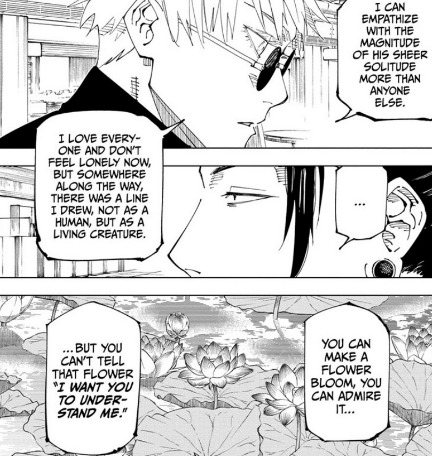
I WANT YOU TO UNDERSTAND ME
It's not surprising to me that Gojo's dying monologue he spent more time talking about his fight with Sukuna than any of his students. Gojo's priority from the beginning isn't to save Megumi but to fight all-out against a strong opponent, the line is: ""The Absolute Strong. The loneliness that follows. The one who will teach you about love is..."
This fight is basically the climax of Gojo's identity crisis which has been a long running issue for him throughout the manga. He's simultaneously a self-confident individualist with an overpowering sense of "ego" and a person with little idea of who he is outside of the role in society that was given to him. Gojo went into the fight looking for someone capable of understanding him, the fight is about Gojo seeking an answer to who he is, that's why he fights and that's why he loses.
Gojo is Not Normal
Nanami's statement is misinterpreted I think.
"You live for Jujutsu. You don't wield it to protect something. You use it solely for the sake of satisfying yourself."
A lot of people took this to mean that Goo didn't care about anyone but himself, even though Gojo directly contradicts this earlier.
"I love everyone and don't feel lonely snow, but somewhere along the way there was a line I drew, not as a human but as a living creature."
He states he does love other people, if only from afar, he just doesn't understand them. Gojo can't make other people his reason to fight, because he only understands himself. He only sees himself. He can only fight for what's inside himself.
"You can make a flower bloom, you can admire it, but you can't tell that flower 'I want you to understand me'
Gojo's students are the flowers. Itadori, Fushiguro and Nobara are all named after flowers. He's raising them up to be as strong as him, he's fond of them, but he doesn't think they relate to him because he exists in a different category of other people.
A lot of people want Gojo to be a more traditional caring mentor figure like Kakashi or Aizawa they're missing what's really interesting about his character. When Nanami says "Gojo only cares about being the strongest" it's true because his entire character is written around the statement "I am the strongest". He is conceptually about what it is like to be the strongest man in existence. That is the character concept, and Gojo's entire identity crisis revolves around that he's built up his personality around being the strongest at Jujutsu and nothing else.

Gojo can only fight for his own ego and self satisfaction as Nanami says, because he has nothing else, he has no identity outside of that.
However, before I get into why I want to point out that Gojo is not normal. It's not because someone on his power level is fundamentally incapable of relating to other people, but Gojo himself...is not right in the head. He's making an active decision to choose not to empathize with people whatsoever, it's not just that it's hard to understand him, it's that they can't understand him.
Gojo talks about his students like they're members of another species. They're flowers. They can't relate to him on a human level because he's something other than human. A friend had an interesting reading on why specifically it's flowers Gojo chose for his metaphor.

Plants are less sentient than insects, they don't contemplate anything they are just taken care of by their gardener and grow towards the sun. That's how differently he sees himself from others.
I wanted to include this take from @kaibutsushidousha as well.

Gojo's not from the planet mars he's a human who has human emotions and human psychology like everyone else, so that's simply not true, but Gojo believes it is and that belief influences how he interacts with everyone.
Gojo can't see himself reflected back in other people for some reasons that aren't his fault and some reasons that are. Gojo has been from birth, treated as different from everyone around him, not for anything he really did but because he was born with a really strong jujutsu ability. He's a literal chosen one. He always seen as the six eyes user, the strongest, before he was seen as a person. His entire life has been defined entirely by the abilities he was born with, he was born to be a Jujutsu Sorcerer so of course that's what he builds his entire identity around.
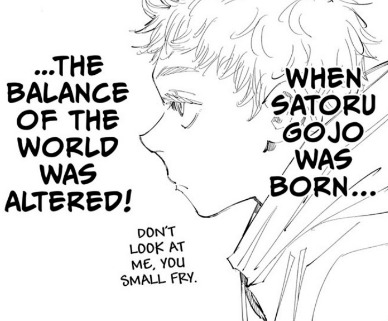
Not only is he told that he's categorically different from others, but he also believes it. We know little about his early childhood besides Gege's statements that he was spoiled, but we do see later on in childhood there are people who are willing to treat Gojo normally despite the position he has as the strongest. This is when it starts being Gojo's fault that he continues to see himself as different from other people.
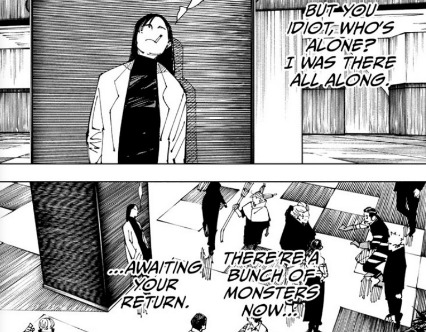
Shoko, Gojo's closest confidante in his schooldays after Geto's days basically tells him that. She's been with him for years and yet he still has the audacity to act like he's all alone in the world. Even when people try to treat Gojo normally and relate to him on a personal level, Gojo actively ignores their presence in his life like he did Shoko because he's not only been told he's different from other people because he's stronger, but he believes it and he's built his entire world view around it.
This is why the only person that Gojo ever let in was Geto, because Gojo believed that Geto was someone who could stand on top with others. THe only person who could believe the strongest, or teach them about love was someone equally as strong. Gojo just happening to meet another sorcerer who was special class as a teenager not only allowed him to have a friend, but fit perfectly into his narrative that he was separate from others and only someone as strong as him could understand. There are people like Shoko and Nanami who treat Gojo normally despite the fact he's the strongest, but Geto was the only one Gojo met in because he met the qualifiaction of being someone equally as strong.
This isn't really the case for Geto. Geto comes to see weak people as inferior yes in the sense he sees Non-Jujutsu Sorcerers as inferior, but Geto is capable of making connections to other Jujutsu Sorcerer. Geto has his family, he has Nanako and Mimiko and the rest of his followers who he all cares about equally. Geto met all of them and chose to relate to them, he even tells Gojo after killing his biological parents that he's choosing who his real family is now.
"It wouldn't be fair if I made an exception for my parents, now would it? Besides my family now consists of more than just them."
Geto demonstrates someone as powerful as Geto can make a choice to relate to other people. It's shown in the way that Geto treats Nanako and Mimiko, he is their father and he raised them as his daughters. Compared to how Megumi is just a student to Gojo. Gojo's only invested in making Megumi into a strong Jujutsu Sorcerer, because Gojo doesn't fathom connecting to someone weaker than him. He's only their to raise up a strong sorcerer, whereas Geto who's capable of connecting with people in other ways is raising up Nanako and Mimiko and they're connected as parent and child.
Geto and Gojo are similiar in a lot of ways, same level of strength comapred to the rest of humanity, same god complex (and yes it is a god coplex, there's a reason the two people Gojo relates to are Geto who has constant religious imagery associated with him and Sukuna who's literally satan) and yet Geto shows someone roughly Gojo's power level can make connections to others Gojo just chooses not to.
This is where I'm stealing from a friend's post a bit. @theanimepsychologist points out that Geto notices the beginnings of Gojo's identity complex soon after it started with Toji.
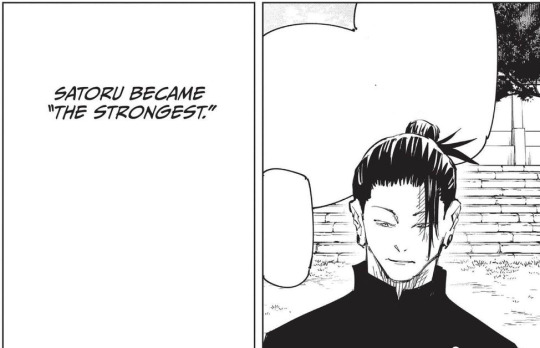
I always thought of the panel above as Geto being jealous of Gojo surpassing him in strength but, in retrospect, I think Geto’s disappointment had more to do with Gojo’s sense of self over-identifying with the title “the strongest” and how that made him harder to relate to, which is one of the main themes in this chapter. I’ll come back to this in a sec. But first… Quick depth psych segway. I think I’ve said this before, but it bears repeating again that an overwhelming sense of self is all ego. There’s nothing wrong with ego per se. The problem is that an over-identification with ego means inherent separateness because, as an organ of the psyche, the ego sense of self is what gives us a separate identity from the collective.
Geto notices that Gojo is drawing a line between himself and other people, and pulling away because of that because people in the second category of weak can't possibly understand the strong and he's reacting to it. Geto is also the only person to underline to Gojo himself that he's unsure about his own identity.

Gojo knows he's the strongest, but he doesn't know anything about himself besides that, or even what being the strongest entails in his relation to other people. He's never constructed an identity outside of it in part because he's never had to, nobody has ever challenged him for his title as the strongest, and he also fits jujutsu society's mould perfectly. He's perfect at what he does, why would he need to change? Why would a person who reached enlightenment at seventeen need to reflect upon himself or figure out who he is? You can't really become more enlightened.
The other reason he's never constructed an identity is he's never interacted with anyone on equal terms. Metaphorically Gojo exists in a vacuum of human interaction. How appropriate is it in a way that he was sealed in a box where time didn't move completely alone for who knows how long, because that's kind of just how Gojo sees himself in relation to the rest of the world.
As Psycho points out an unregulated ego results in an inherent separateness from the collective. People don't exist in a vacuum however. We wouldn't know who we are if we were entirely alone. We are defined just as much as ourselves, as we are by our interaction with others.
Ich and Du, translated as I and Thou is a book by philosopher Martin Buber. His two main porositions is that we may address existence in two ways:
The attitude of the "I" towards "it" towards an object that is separate in itself, which we either use or experience.
The attitude of "I" towards "Thou" in a relationship in which the other is not separated by discrete bounds.
I -> It is the world of sensations. If I am looking at a chair, I say "This is a chair. This chair is an eyesore." I am seeing the chair. I don't relate to the chair.
I -> Thou can be used to refer to a relationship between human beings. You don't experience the human being., you can only relate to them and what that relationship means to you. He goes on further to say that love requires a subject -> subject relationship. To love someone means you have to relate to them as if they are another being, you can't love an object.
He's a philosopher to put forward that it's human's connections with each other and their ability to relate to each other that brings meaning to life. Gojo in Buber's terms is only experiencing the world around him, not relating to it. How appropriate of someone with the six-eyes, an ability that gives him sight far better than anyone else to see himself as only an observer to the outside world, like a floating pair of eyes.
The choice that Gojo makes not to relate to other human beings on an equal level, not only isolates him, it affects his sense of self. People cannot exist within a background. Gojo's like a vampire who can't see his own reflection. ? It's all because of this caveat that Gojo himself has set up that no one can possibly relate to him unless they were equally as powerful as him that he can't see himself in others. He can't see himself in others, he can't find anyone to help him understand himself, and therefore his identity crisis goes unresolved.
Twitter user @ det_critics pointed this out that the question: "Take away his strength and what is he?" isn't one Gojo has an answer for, and one he's actively been running from.

As I said Gojo literally doesn't have a reflection, we see that in story when the prison realm opens its eye and it's just a void where Gojo's face is supposed to be. Gojo choosing not to think of himself as the strongest is also a choice not to think about who he'd be if he wasn't. A question he evades over and over again by telling himself that he can't be understood by people who are weak b/c he categorically exists on a different plane of reality.
When he does look for an answer it's telling just how not normal Gojo is in who he chooses to empathize with: which is Sukuna.
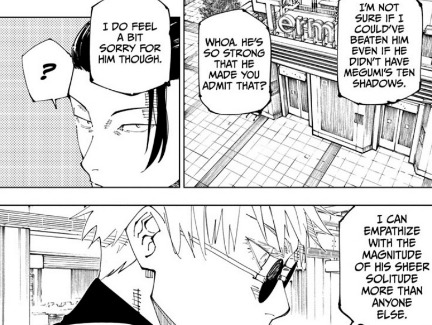
This is who Gojo as chosen to be the only other person besides Gojo he felt he could relate to. The same person who monologues about weak people like this.


The same person who monologues that weak people shouldn't even be alive, they should be culled. Sukuna sees weak people as insects. Gojo sees them as plants.
The first person that Gojo relates to as a subject rather than an object Geto is cut short, the next person he relates to as a subject is Sukuna of all people. He chooses to see himself in Sukuna, because Sukuna validates that incorrect idea Gojo has that someone as powerful as him could never possibly be understood by other people. After all, Sukuna the strongest sorcerer of all time isn't even really human anymore, he's a curse a calamity. For Gojo who doesn't see himself as relatable to other human beings this is validation of that mistaken notion.
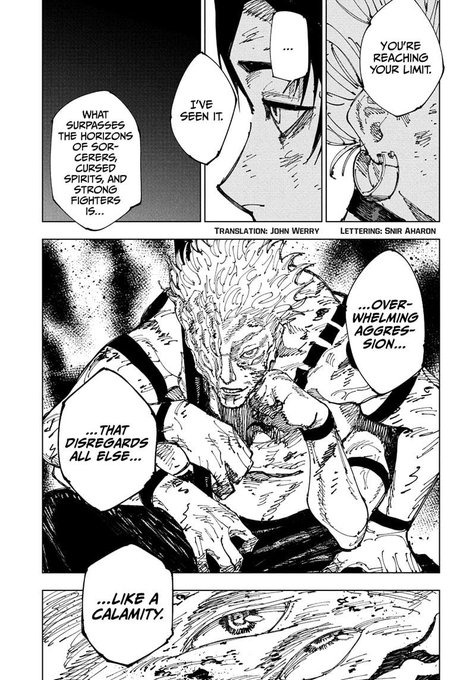
It's also telling of how much Gojo's own identity issues have warped him that he finds a curse personally relatable, and even pitiable because it's lonely. Sukuna, who's main problem is that he's bored because a life of killing people is unfulfilling and it's turned him into an adrenline junkie. This is who Gojo's personally chosen to relate to because they both only see the world in the category of "the strong" and "the weak."
Gojo's viewpoint of other people is mistaken for several reasons, but one interesting one was pointed out for me by Psycho. He refers to his students as flowers, but they're lotus flowers. Lotus flowers mean many things, but they're seen as symbols of purity because they rise up from the mud. Gojo is only looking at the flowers, not the mud they rise from .
"No mud, no lotus. The mud is what makes us who we are, and no one can 100% understand what wading through the mud feels like. I think people see oh shiny lotus, the outcome of wading through the mud but they overlook the self because we live in an outcome oriented society.
Gojo is someone who doesn't see the mud and therefore doesn't relate to the personal struggles of others. Which sabotages a lot of his personal relationships. Which like, to bring Megumi into this, Megumi is proof that Gojo IS NOT NORMAL.
Megumi is the kind of special genius that Gojo is, he's born with the strongest technique one capable of killing Gojo, but he doesn't become a special class at seventeen like Gojo, nor is he interested in doing that because Megumi is an entirely different person with differnt personal struggles than Gojo. He has all the raw potenital that Gojo does, but they have wildly different upbringings. Gojo was primed for success by being the spoiled child of his clan, while Megumi is an abandoned child. It proves again Gojo's maxim of people who have that much power are inhuman and don't follow human psychology is wrong because Megumi has all the potential to be as strong as Gojo, but he's just a normal kid. Megumi is still wading through the mud and Gojo doesn't see that.
GOJO IS NORMAL
Jujutsu Kaisen seems to be following Buber's logic on how identity is defined by the interactions we have with other people, because there was a period in Gojo's life where he did create an identity outside of being a sorcerer and that's when he was Geto's friend.

In the afterlife we even see him regressing to that previous state of being. There was a period for three years in his life that Gojo was something besides being the strongest, and that was when he was Geto's friend too. If Jujutsu Kaisen is about how identity and meaning are both constructed from the interactions we have with other people (subject -> subject) interactions then it's telling that Gojo reverts to his seventeen year old self because that was the first and only time in his life he was capable of relating to another person, and acted like a fully developed person outside of the role of sorcerer he was born to play.
If identities are constructed though that means they're not inherent. Gojo is not inherently the strongest, just as he's not inherently different from other people. This is different from what Gojo's been told his entire life. He was born the strongest. It's inherent to his identity, a fundamental part of who he is. Therefore people who are strong are inherently different from those who are weak, it's something internally different about them which makes it impossible for Gojo to comprehend the motivations of weak people.
Rather than just strong and weak being constructed categories. Gojo's the strongest at Jujutsu but if you took him outside of Jujutsu and asked him to work any other job he'd no longer be the strongest. He's only the strongest as long as he remains in his fish bowl that is Jujutsu Society. However, Gojo believes differently, he believes being the strongest is what he is, it's something inside of him, and something that makes him fundamentally different from others. This is the line that Gojo has been told due to being born with the six-eyes and this is what Gojo has bought.
This is also what his ability the limitless symbolizes, no one in this world can touch him or reach him, he exists somewhere else. However, the limitless can be breached and Gojo has been shown before there are others capable of touching him.


Toji is the first and only living human being to challenge him, until Sukuna comes along. However, Toji does arguably more in story than just give Gojo a good fight. Toji full on traumatized him, soemthing which Gojo refuses to acknowledge. Toji is the beginning of the end of Geto's friendship, the death of Amanai Riko sends Geto on a spiral for an entire years, and drives a wedge between Geto and Gojo's friendship when Geto self isolates and Gojo doesn't know what's wrong with his friend.
Gojo also experiences what it's like to be defeated for the first time in his life, and his response is to perfect the limitless so he runs it constantly all the time. Remember, before that he was exhausting it doing it for three days in a row, and when Geto told him to take a break Gojo reassured him he wasn't worried because he knew Geto had his back. Gojo was someone who could let down the limitless before that, but afterwards Gojo always insists on fighting alone with his shields up all the time. All to deny that feeling of vulnerability that Toji inflicted on him for the first time in his life, something he remembers years later, you know like trauma.
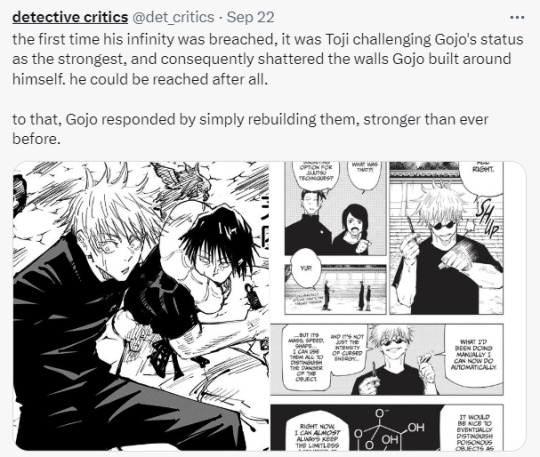
There are times when Gojo is reminded that it's possible he's the same as anyone else, he can experience human weakness. Geto's fall is another time, one post says it's particularly challenging for Gojo to comprehend why Geto would defect because he saw Gojo and himself as above others and therefore immune to human weakness.
gojou 100% has a god complex and thats why getous downfall hit him harder than anyone else. he saw himself and getou as above everyone else and exempt from ‘regular’ peoples flaws, he never thought either of them could be led astray and when getou finally snaps hes bewildered that something like that could ever happen to either of them. hes not just heartbroken over his best friend becoming an enemy, hes thrown for a loop because getou, the one person he thinks of as just as above everyone else and incapable of failing as he is, could ever do something wrong, could ever be wrong. hes finally put into a position where he has to face the fact that hes just as capable of screwing up as anyone else and he can’t make sense of it. gojous hesitance in killing getou isn’t just a byproduct of their friendship, it’s also him realizing that it could have easily been him on the other side of the conflict, which breaks the illusion of him being better than everyone for a second. and like that’s still not enough for him to reject this idea, personally i think that his comment about him and getou being 'the strongest’ in volume 0 is indicative of the fact that despite everything he still hasn’t grown out of this delusion.
Gojo has trauma, because he's a human being with human psychology. He makes mistakes, he has terrible past regrets like his friendship with Geto gone wrong, but he doesn't acknowledge those things because as stated above Gojo thinks he's immune to having regular people flaws. Gojo seeing himself in another category from regular human beings also allows himself to deny an vulnerability, because the strongest isn't supposed to have weaknesses. Seeing yourself as too distant to ever be touched by others also means they can never hurt you, emotionally or otherwise, an extreme form of the hedgehog's dilemna which is explored an Neon Gengesis Evangelion, an existentialist piece Gege takes obvious inspiration from.
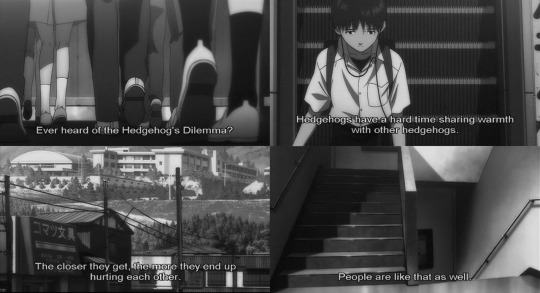
The fact that he avoids other human beings, not because he's fundamentally incapable of understanding them but because he's distancing himself from human feelings like loss, pain, suffering these weaknesses that are part of the human experience just proves he's the same as everyone else. If he wasn't capable of feeling those things he wouldn't avoid it, he wouldn't spend ten years mourning Suguru but not killing him directly until he was forced to on December 24th, he wouldn't be trapped by the box because seeing Geto alive made him have a three minute long trauma flashback.
Gojo is a normal human, with normal human emotions and human psychology, albeit twisted from the power he was born with and his unique viewpoint of the world but he doesn't believe that he is. He uses that as an excuse not to interact with others and because of this his identity suffers. Gojo is someone defined by how limited he is in the story despite having limited power.
Gojo fails as much in the story as he succeeds. As my friend @justapanda put it.
"But, it loos like being strong isn't enough..." Another point could also be made here that, regardless of being the strongest at this point, Gojo was incapable of stopping his closest friend from straying down a dark path, which is perhaps Gojo’s greatest failing in the series. This failure also comes back to bite him much later on as Kenjaku’s ace in the hole to finally checkmate Gojo involved surprising him with the now possessed body of Geto, which distracted Gojo long enough for him to be successfully sealed by the prison realm. Once again, the vast amount of power that Gojo had attained turned out to be completely useless in preventing his own sealing, which has now placed him in an inactive role for over half of Jujutsu Kaisen’s duration. Earlier in the story, Gojo once said: “Ironic, isn’t it? Given everything, but unable to do anything.” when referring to the function of his own domain. This was another intentional use of foreshadowing to describe the dilemma that Gojo was inevitably going to face himself. Satoru Gojo is no limitless man, for no one man is without his limits." Another point could also be made here that, regardless of being the strongest at this point, Gojo was incapable of stopping his closest friend from straying down a dark path, which is perhaps Gojo’s greatest failing in the series. This failure also comes back to bite him much later on as Kenjaku’s ace in the hole to finally checkmate Gojo involved surprising him with the now possessed body of Geto, which distracted Gojo long enough for him to be successfully sealed by the prison realm. Once again, the vast amount of power that Gojo had attained turned out to be completely useless in preventing his own sealing, which has now placed him in an inactive role for over half of Jujutsu Kaisen’s duration. Earlier in the story, Gojo once said: “Ironic, isn’t it? Given everything, but unable to do anything.” when referring to the function of his own domain. This was another intentional use of foreshadowing to describe the dilemma that Gojo was inevitably going to face himself. Satoru Gojo is no limitless man, for no one man is without his limits.
Gojo has moments where he brushes up against the idea that he's not capable of doing everything, that he has faults and fails like every other human being. However, that feeling never really lasts for long. He always tends to double down on his belief that he's the strongest rather than facing his faults because that's where he's comfortable. Gojo can't see himself reflected in other people and therefore is not capable of reflecting and critically evaluating his faults. Not only that but avoiding looking too critically at those losses, he also stops himself from feeling the pain of those losses and denies that vulnerability.
Gojo exists on another plane from other human beings, and therefore why would he experience human sadness and pain? All he feels is a vague sense of loneliness and unfulfillment because he's been so alienated from his own emotions and in Gojo's mind that's better than struggling with weakness. Who would deliberately choose to be just like everyone else when you can be special? Why get close to others when the hedgehog's spines are just going to stab you? However, people form connections because of their weaknesses. Humans cooperate with each other because they are a social species. All of society exists because people divide labor and help each other out. Even Gojo can't say there's no point in his life where he was weak, because he was cared for as a child and raised in a family. He didn't come out of the womb a fully formed individual. The darwinian survival of the fittest, and the black and white strong vs. weak way that Gojo sees the world just doesn't exist, especially in modern society. There's nothing wrong with individualism, but the extreme end of individualism is wrong because no one exists in this world alone you share it with everyone else.
Gojo doesn't even see that though, because he's not living in the same world as everyone else. In his mind the limitless makes it so he basically exists on another plane of reality, but again the limitless can be breached.

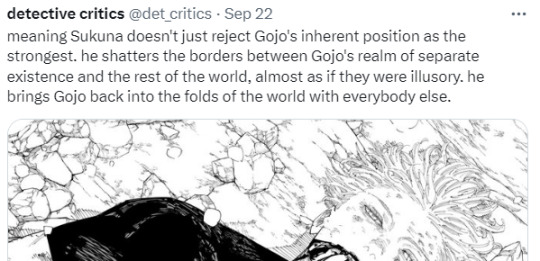
Detective critics basically said that Gojo's delusion was always a false one, he always existed in the same world as everyone else, he simply deluded himself into believing otherwise. There are reasons for this, his upbringing, trauma and not wanting to face the pain of that trauma, but it's still a choice he made. Gojo didn't want to live for other people, he didn't want to relate for them, so he lived for himself pursuing his own strength. Ironically, it reflects Toji's own decision to take pride in neither himself or others and live only for the sake of showing that the Jujutsu World that rejected him was wrong.

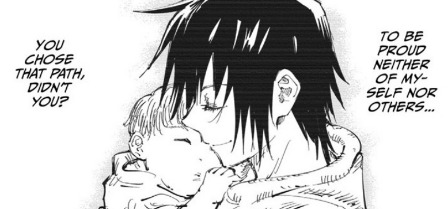
Toji chose to live a life where he only lived to fight and prove he was stronger than the sorcerers who rejected him. He chose it over his own son Megumi, abandoning him in order to continue his lifestyle as a mercenary. He even chose it over continuing to live because he stayed and fought against Gojo to prove he was stronger than the pinnacle of Jujutsu. Toji lives for strength, and he is someone even Gojo respected the strength of, but what else does he have?

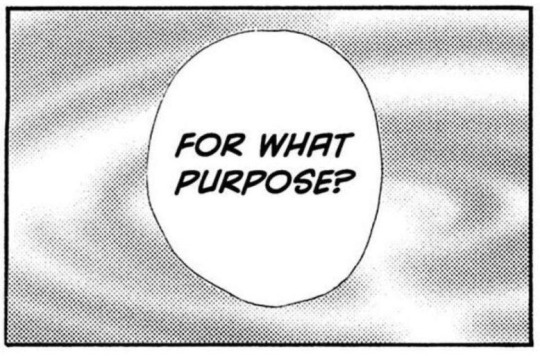
Toji's identity is unstable, he doesn't really live for any purpose, he kills people then blows the money gambling, he jumps from women to women to mooch off of them, he's also mentally unstable as well he shoots a little girl in the back of the head and feels nothing. The instability comes from his isolation, Toji is rejected by everyone the same way that Gojo is lauded by everyone. But Toji goes on step further in that he fails to construct any identity outside of being rejected and his entire life is spent rejecting the people who rejected him. Why does Toji want to be strong, he doesn't know. Purpose is something you have to construct for yourself, because there's no inherent meaning to life. Identity is something that's constructed by both yourself and your interactions with others because people aren't born inherently one thing or the other.
Gojo and Toji just refuse to do this, and only focus on themselves and the goal of being stronger. In Gojo's case I'd argue he doesn't fight for other people because he doesn't feel that connection with other people or rather he doesn't let himself. Hedgehog's dilemna to the extreme. Gojo only fighting for himself isn't Nanami calling him a selfish person who doesn't care about others, it's sad because Gojo never found any other reason to fight or meaning to his life but by getting stronger for its own sake.

Gojo only fights for the sake of satisfying himself, but here's the clincher, he's unsatisfied. Not only did he fail in his goal of giving Sukuna the fight of his life, because he knew Sukuna was holding back on him, but also admits to Geto that what would have really been satisfying is if Geto was there with him to pat him on the back.
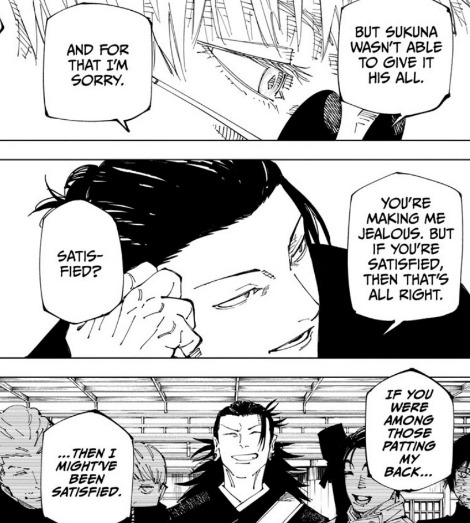
He's failed on both fronts, he's failed at being the strongest and he's failed at making a connection to the people in his life. Gojo and Toji die in pretty much the same way, they die standing up in the middle of battle, but their last thoughts aren't of disappointment that they lost but their loved ones.

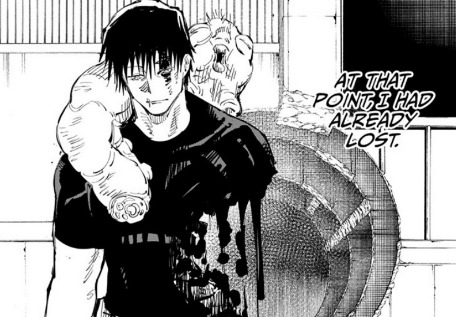
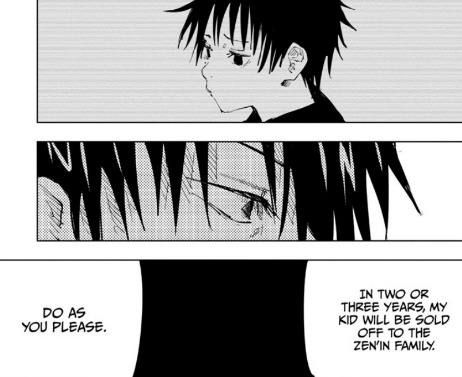
They spent their entire lives believing they were stronger and therefore different than others, and fighting to satisfy their ego and what does it amount to? Toji lived a life of hedonism and then died abandoning the one person he genuinely loved. Gojo has failed his stated goal of revolutionizing Jujutsu Society and dies before he can see whether or not his dream of a reset Jujutsu World will even come to fruition.
They belived they were someone stronger and therefore inherently better, and are put in their place when someone stronger comes along. They die just like all the other mortals. They believed they were alone so they died alone. It's sad and it goes to show how destructive being "the strongest" was to Gojo's identity in the end. Gojo thinks he's Sukuna but Gojo doesn't want to be Sukuna, because Sukuna's alone, and unlike Gojo you could make the point that Sukuna's not a human being who has human emotions because he's a curse. If Gojo was truly someone who could understand Sukuna he would have been truly alone the same way Sukuna is, and that's not what he wanted.
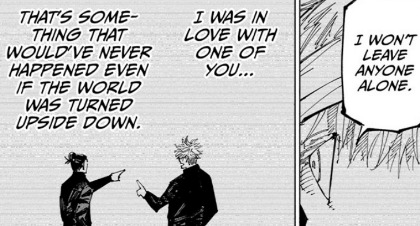
It's too bad Gojo never thought seriously about what he wanted, and therefore learned his lesson too late. He was always looking for someone he could relate to, except for in the people who were right in front of him.
#gojo satoru#jjk meta#satosugu#ryomen sukuna#geto suguru#jjk 236 spoilers#jujutsu kaisen 236#jjk 236#jjk spoilers#jujutsu kaisen 236 spoilers#jujutsu kaisen spoilers#jujutsu kaisen#jujutsu kaisen meta#god this analysis is so good#haha god see what i did there
1K notes
·
View notes
Text
no tv show will ever be able to resolve a m/m/f love triangle as perfectly and as weirdly as Hannibal, in which the woman kisses one of the guys, sleeps with the other one, then decides "actually, never mind, you're both awful!" and marries a rich lesbian instead - and, while this is all going on, the guys develop a weird homoerotic obsession with each other culminating in them going off a cliff together. truly unhinged and unmatched
62K notes
·
View notes
Text
it’s all about getting kicked down and standing back up and getting kicked down and standing back up and getting kicked down and standing back up and getting kicked down and standing back u
706 notes
·
View notes
Text
in this new year I want you to be alright. I hope you move out. I hope you have enough money to feel safe. I hope you abandon shame and forgive yourself. I hope you get enough sleep and some good news. I hope you laugh a lot and the heaviness of the world eases a bit. I wish you to be alright.
80K notes
·
View notes
Text
losing my shit at the jjk0 reviews on letterboxd




3K notes
·
View notes
Text
"Tell you a secret. Your worldview's gonna change. Once you hear it you can't unhear it"
"If you want to shake things up, you start with something small."

"You break a norm, or an idea, or a convention, some little business model. But you go with things that people are kind of tired of anyway."

"Everybody gets excited because you’re busting up something that everyone wanted broken in the first place. That’s the infraction point."

"That’s the place where you have to look within yourself and ask, 'Am I the kind of person who will keep going?' Will you break more things?"

"Break bigger things?"

"Are you willing to break the thing that nobody wants you to break?"

"Because at that point, people are not gonna be on your side. They’re gonna call you crazy. They’re gonna say you’re a bully. They’re gonna tell you to stop. Even your partner will say, 'you need to stop.' Because as it turns out, nobody wants you to break the system itself."

"But that’s what true disruption is."

3K notes
·
View notes
Text
Oh my god I just realized
While the title “glass onion” is from an expression, it’s most famously associated with the Beatles song of the same name, the movie knows this, the song plays in the end credits
Practically every single lyric in the song glass onion alludes to other Beatles songs, in a way that makes it seem like it’s ripe for complex analysis and such
key word is seem
The actual story behind why the song glass onion exists is that the Beatles got wind that school teachers, in a desperate attempt to get their students to actually pay attention, had begun to create assignments based around analyzing the deeper meaning of the lyrics in Beatles songs
Nearly all of this “analysis” was grasping at straws and rarely based around the actual intentional meanings of the songs
So the four made a little plan, two songs came from it, I am the walrus, and glass onion
The lyrics of I am the walrus are utter nonsense that are just coherent enough to sound like its some complex piece ripe for analysis
Glass onion, by alluding to past Beatles songs in certain ways, also builds up this image of intricate complex layers, making it seem deeper than the true meaning and intention of the song, i.e. the Beatles deciding to pull a little prank
Something that at first appears to be made of complex intricate layers but in reality it’s true meaning is quite simple and banal, gee, were have I heard that before
2K notes
·
View notes
Photo




GLASS ONION: A KNIVES OUT MYSTERY (2022) dir. Rian Johnson
2K notes
·
View notes
Text
Of course I love how Benoit Blanc is so shamelessly, fabulously, himself. How he’s gayer than a tree full of monkeys on nitrous oxide [GNU Terry Pratchett], of course. How he doesn’t hide that his brain is peculiar, for better or for worse. How he picks the cases he likes.
But I also love that in Glass Onion Rian Johnson shows us that Blanc can choose to be himself because he’s protected by his privilege of rich, upper-class, white man.
Which in turn leads me to notice how in both movies Blanc uses his privilege to protect two working-class women of colour, but he always refuses to be their saviour. He just creates the conditions in which they can choose to be themselves and save themselves—and punish their oppressors.
7K notes
·
View notes
Text
my favourite thing abt the bbcu (benoit blanc cinematic universe) is that the connecting thread of the movies isnt a benoit blanc but the underlying story of "disenfranchised woman of colour wins over stupid rich white guy aided by a detective who can only be described as 'miss marple if she was gay and from the american south'"
3K notes
·
View notes
Text
The among us scene is truly one of the best things about the new knives out movie BECAUSE SOMEONE had to sit JAMES BoND down and explain amongus to him. He is a 54 year old man. Absolutely groundbreaking cinema.
2K notes
·
View notes
Text
Imagine being so gay that you and your girlbestie have taken over the entire #gay tag. That's the power of benoit blanc babey
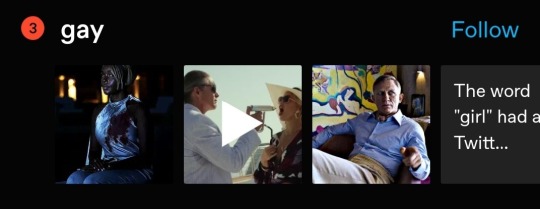
6K notes
·
View notes
Text
As perfect as the ending of Glass Onion was, what would truly bring the movie full circle for me would be a post-credit scene where Benoit Blanc plays Among Us with Helen's 3rd grade class. Imagine the chaos, the plotwists, the betrayals, the DISRUPTION.
1K notes
·
View notes
Text
Obsessed with how Glass Onion broke down character personality through masks right at the beginning. Birdy is the most obvious with her stupid, frivolous, and deeply insensitive mask that lines up with everything we before and after. Duke of course has no mask at all. Lionel not only has a mask, but it seems to be high quality. He knows the risk but ultimately is still with a dangerous and highly risky crowd. Claire has what looks like a sensible mask, but doesn't apply it properly, with having stuff stick out of it and it failing to cover her nose. And Blanc is the only character to put his mask back on after the injection. This fucking movie guys I'm losing my mind
6K notes
·
View notes
Text
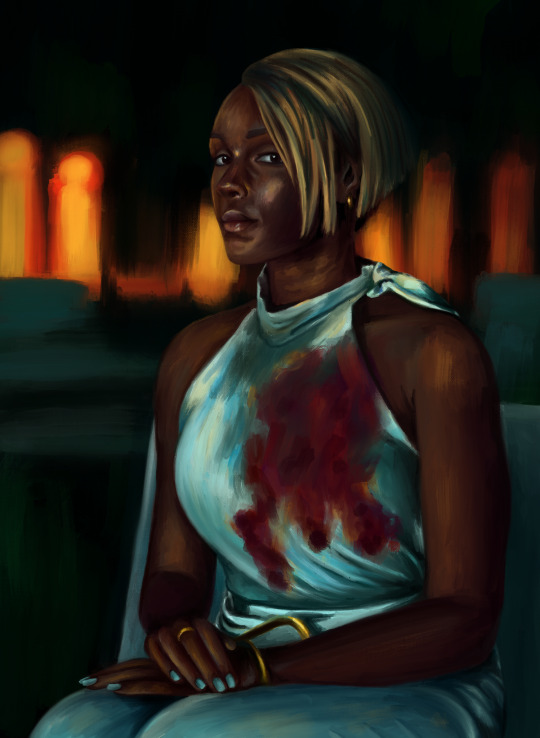
so i watched glass onion last night and just had to redraw this shot
3K notes
·
View notes
